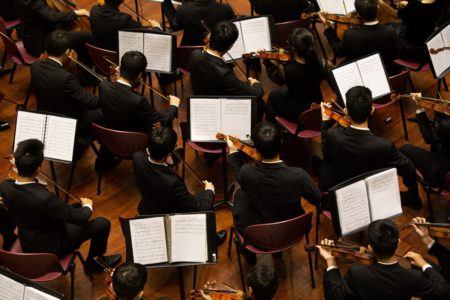By Rev Dr Peter Blackwood
I sing in choirs and have sung oratorios and masses, operas and requiems, Bach, Mozart, Rachmaninoff and The Beatles.
Now, for the first time, I am singing science.
‘Origins’, to be performed at the Melbourne Recital Centre next month, is an oratorio by Jenny Graves and Leigh Hay with music by Nicholas Buc. This account in music of the origin of the universe and life on earth is an initiative of Professor Emeritus Jenny Graves AC.
It is a response, in part at least, to Joseph Haydn’s ‘Creation’ (1798) that bases its text on the creation stories in Genesis.
Jenny is an evolutionary geneticist and in 2017 she won the Prime Minister’s Award for Science.
She is famous for her work on the development of mammals, especially marsupials, including her genetic prediction that the Y chromosome will disappear in the future.
Jenny and her husband, John, are members of the Heidelberg Choral Society. The libretto is a collaboration between Jenny and Leigh Hay, a poet who is also a member of the choir.
The Heidelberg Choral Society commissioned Nicholas Buc to set the text to music for four part choir, four soloists and orchestra.
Nicholas is a composer, conductor, arranger, violinist and pianist who studied composition with Brenton Broadstock and lives in New York.
I am also a member of the choir but I didn’t get to the first rehearsal. A few days after her first encounter with the score, a member of the choir rang me to ask why this secular work sounded a bit religious.
I am a Minister and am supposed to know about this kind of stuff. I asked the chorister to read me the words that sounded a bit religious.
She read the opening words, “Nothing, nothing, nothing, magnum mysterium…”.
It was the Latin phrase that sounded religious to my caller. The bits that sounded most religious to me were the next phrases, “nothing, quiet quantum quilt, blankets a boiling brew, positives and negatives together annihilating”.
The words took me back to theological college and lectures in 1975 with Fr John Scullion SJ on the book of Genesis.
In those classes I learned about the doctrine of creatio ex nihilo (creation out of nothing).
I learned that Genesis’ opening account describes the beginning of earth as a “formless void”, as chaos.

“One of the delights of singing `Origins` is learning interesting science and the development of evolution theories,” says Rev Dr Peter Blackwood.
It seems to me that “quiet quantum quilt blankets a boiling brew…” is a poetic improvement on “the earth was a formless void”.
My immediate response to the phone call was amazement and excitement that when theologians and scientists ponder the origins of the earth and life, both are open-mouthed in wonder at the great mysteries they present, the magnum mysterium.
Both reach for similar words to express their delight. Part 2 of the work reflects Genesis 1 verse 1 quite explicitly: “A primeval soup, inanimate brew, molecules squished in a chemical stew. Stirred by wind, cooked by sun … order from chaos, coalesce”.
One of the delights of singing `Origins` is learning interesting science and the development of evolution theories.
Nicholas Buc, an aspiring film composer, reflects the fun and majesty and drama in his music. He is kind to the choristers with singable lines and engaging rhythms.
He does not hang the tenors out to dry on high Gs for bar after bar like some baroque composers. The orchestra probably will not thank him for the movement with a key signature of seven flats (Ab minor).
More and more words of the oratorio have taken me back to Hebrew and Christian Scriptures as I rehearse, especially as Part 4 reflects on the dominant mammal.
The text enjoins humankind to “obey the ancient law be fruitful, grow and multiply”.
Genesis ascribes similar words to the mouth of God in Genesis chapter 1 verses 22 and 28. But wait, there is more.
Religious theology gives a lot of attention to humanity’s propensity to muck things up. The church calls this ‘sin’.
`Origins` describes it this way, “mankind, misled by false conceits … dominated by our own desire for dominance”.
Genesis comments on human conceit when the serpent in the Garden of Eden tells the woman, “you will not die; for God knows that when you eat of it your eyes will be opened, and you will be like gods …” (Genesis 3:4-5).
I am enjoying learning to sing `Origins`. Apart from the fun of making music, I am invited to ponder how scientist and theologian consider the same mysteries of human existence and speculate on our chances of survival with eyes alert to signs of hope.
This modern secular oratorio is not a science verses religion event but a helpful contribution to a conversation between two branches of human enquiry that marvel at how all that is came into being and how humanity fits into it all. The words and music of `Origins` set out to celebrate the science of who and how we are and where we might be headed.
Retired Uniting Church Minister Rev Dr Peter Blackwood and Yarra Yarra Presbytery Secretary Geoffrey Grinton are members of the Heidelberg Choral Society, which will perform ‘Origins’ at the Melbourne Recital Centre on July 18.


